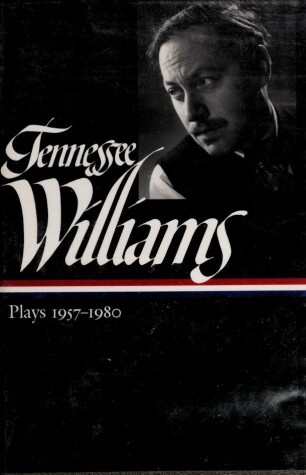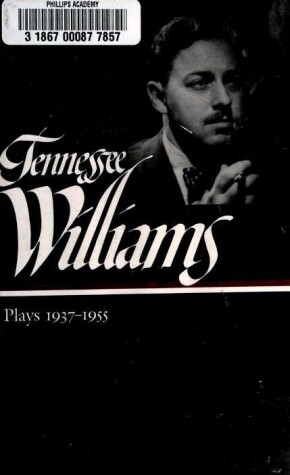Library of America
2 total works
119-120
Exploring human passion with daring and unflinching honesty, Tennessee Williams forged a poetic theater of raw psychological insight that fused realism and expressionism. Now, in an authoritative two-volume edition, The Library of America collects the plays that reveal a prophetic figure in American life and letters—a writer of generous sympathies and uncompromising frankness who reached wide audiences with plays that revolutionized the themes and styles of the modern theater. This second volume traces Williams's career as it evolved in his adventurous and sometimes shocking later works, including Orpheus Descending, Suddenly Last Summer, and Sweet Bird of Youth, plays that stirred controversy when first produced because of their concern with acts of horrific violence; the satiric marital comedy Period of Adjustment; The Night of the Iguana, a moving drama set in Mexico that contains some of Williams's most lyric writing, and The Eccentricities of a Nightingale, a re-imagining of the earlier Summer and Smoke.
The Milk Train Doesn't Stop Here Anymore, with its use of Kabuki-like stylization, began a more experimental phase of Williams's writing, represented here by Kingdom of Earth (also known as The Seven Descents of Myrtle), The Mutilated, Small Craft Warnings, and Out Cry. In late plays such as A Lovely Sunday for Creve Coeur and the autobiographical Vieux Carré, Williams returned to many of his earlier themes and settings.
This edition includes a newly researched chronology of Tennessee Williams's life, explanatory notes (including cast lists of many of the original productions), and an essay on the texts.
The Milk Train Doesn't Stop Here Anymore, with its use of Kabuki-like stylization, began a more experimental phase of Williams's writing, represented here by Kingdom of Earth (also known as The Seven Descents of Myrtle), The Mutilated, Small Craft Warnings, and Out Cry. In late plays such as A Lovely Sunday for Creve Coeur and the autobiographical Vieux Carré, Williams returned to many of his earlier themes and settings.
This edition includes a newly researched chronology of Tennessee Williams's life, explanatory notes (including cast lists of many of the original productions), and an essay on the texts.
119-120
Tennessee Williams's explosive, often violent, plays shattered conventional proprieties and transformed the American stage. They inspired some of the most famous productions and performances in theatrical and film history, and they continue to grip audiences all over the world. Now, in an authoritative two-volume edition, The Library of America collects the plays that define Williams's extraordinary range and achievement. This first volume begins with the stunning rediscovered plays of Williams's early career: Spring Storm, a tragedy of provincial longing that prefigures the mood and language of his later work, and Not About Nightingales, a stark prison drama, produced in 1998 to international acclaim, that resounds with the playwright's outraged idealism. With the autobiographical The Glass Menagerie in 1944, Williams attained what he later called "the catastrophe of success," a success made all the greater by A Streetcar Named Desire, his most famous play and one of the most influential works of modern American literature.
Forging an idiom that uniquely blended lyricism and brutality, a tragic sense of life and a genius for comic observation, he continued to revolutionize the American theater with a series of masterpieces: the poignant and melancholy Summer and Smoke, the light-hearted erotic comedy The Rose Tattoo, the sprawling and surrealistic Camino Real, and Cat on a Hot Tin Roof, the Pulitzer Prize–winning portrayal of a ruthless family struggle. This volume also contains Battle of Angels (an early version of Orpheus Descending), and a selection of Williams's one-act plays, including 27 Wagons Full of Cotton, The Property Is Condemned, and I Rise in Flame, Cried the Phoenix, a meditation on the life and work of D. H. Lawrence.
This edition includes a newly researched chronology of Tennessee Williams's life, explanatory notes (including cast lists of many of the original productions), and an essay on the texts.
Forging an idiom that uniquely blended lyricism and brutality, a tragic sense of life and a genius for comic observation, he continued to revolutionize the American theater with a series of masterpieces: the poignant and melancholy Summer and Smoke, the light-hearted erotic comedy The Rose Tattoo, the sprawling and surrealistic Camino Real, and Cat on a Hot Tin Roof, the Pulitzer Prize–winning portrayal of a ruthless family struggle. This volume also contains Battle of Angels (an early version of Orpheus Descending), and a selection of Williams's one-act plays, including 27 Wagons Full of Cotton, The Property Is Condemned, and I Rise in Flame, Cried the Phoenix, a meditation on the life and work of D. H. Lawrence.
This edition includes a newly researched chronology of Tennessee Williams's life, explanatory notes (including cast lists of many of the original productions), and an essay on the texts.

